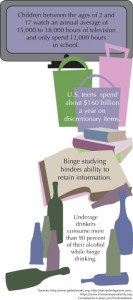Teens feed into binge culture
April 30, 2015
Liana Lum
News Editor
From Netflix to Instagram and Spotify to PostMates, teenagers are consuming services and products on demand, contributing to an increase in consumer culture.

“Consumer culture is spending money on things everyday that you probably didn’t need,” junior Rebecca Bruce said. “I think of the buy and throw out cycle.”
Consumption becomes an activity that holds meaning beyond fueling the economy, according to the Association for Qualitative Research.
“We’re a very materialistic culture, whether subconsciously or consciously,” Julia Arce, who holds a master’s in theology, said. “Sometimes that offers us comfort, but it often offers a false sense of compensation — we have to binge on getting things to compensate for ourselves or others, realities we can’t make up for personally.”
Binge drinking in a party atmosphere and eating disorders involving binge fasting can be characterized as indulging in binge culture. School counselor Annie Egan compares watching multiple shows on Netflix in one setting, which doesn’t have a built in structure for the allocation of time, to reading a book or television show that just ends.
“In general, it just makes it harder to do the right thing,” Egan said. “These decisions are being made for you, and it takes a lot more effort to say, ‘Yes, it is more important for me to be studying than watching Grey’s Anatomy.’”
Sixty-one percent of Netflix customers binge watch regularly, according to a 2013 Netflix study. The video streaming site’s users define binge watching as watching between two to six episodes of the same television show in one sitting.
This indulgement in binge consumer culture can affect teen growth and development. Feelings of loneliness, depression and self-regulation deficiency, or a lack of self control, are directly correlated with binge watching, according to a study from the University of Texas at Austin.
“For teens who are accustomed to technology and having applications right at their fingertips, you have a sense that you can get information or buy products right away,” Arce said. “That might be a distortion of what growing up or learning should be about.”
Teens are growing up in a culture that feeds into unattainable perfectionism and insecurity, according to Charis Denison, owner of Prajna Consulting, a consulting agency specializing in teens and families.
“Consumerism has always banked on the fact that if you feel okay about yourself, then no one is going to make any money,” Denison said. “It creates a society of people that are convinced they simply aren’t enough as they are. Now there are a million ways for you to believe if you buy this thing or hit this button or do this thing, you might become better.”
Companies see teens as a target audience because they are often experimenting and their brand preferences are not permanent, according to Lars Perner, assistant professor of clinical marketing at the University of Southern California. Marketers use convenience, like recommendations on Youtube or Netflix videos, and “obsolescence,” making consumers perceive their products as outdated or worn out when they are actually functioning properly, to increase consumption.
“Other ways products are popular is if they’re able to serve many needs for people,” Perner said. “If you look at an iPhone, people end up spending a fair amount of money just to pay for the phones but also for the service plan. But on the other hand, they provide new opportunities.”
Denison says it is possible to develop an awareness to this culture by practicing self-discipline.
“If you’re in a situation that is unfamiliar, one of the most often things that end in regret is if you act too quickly,” Denison said. “So you count to three, and you ask yourself, ‘How am I feeling right now? What do I think about it? What can I do moving forward that will bring me honor, not regret?’”
A strong internal compass can be further developed through demanding commitments like sports and spiritual practice, which requires believers to foster a deeper relationship with discomfort, teammates or a god of mystery, according to Arce.
“Teens can develop self discipline by using their technology to help them budget time so that they only need to make the decision once, whether it be using a timer or an iPad app,” Egan said. “Then they have created the environment that makes the decision for them versus watching one show for an hour and then having to make the decision again once the show is finished.”
Consumer culture can be beneficial as it boosts the economy and improves teenagers’ access and hunger for knowledge, according to Denison, who says that the teen generation has the potential to redefine culture through their media savviness and entrepreneurial risktaking.
“I think of magazines and how we used to get subscriptions, and they’d come out every month,” Bruce said. “We no longer have that because now I just look on Buzzfeed. For me that’s consumer culture of information because I don’t choose what article I read. I just consume whatever’s getting put in front of me.”









